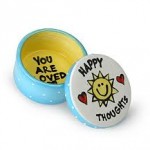I am not what happened to me
I am what I choose to become
Carl Jung
 Happier people think differently. They tend not to stay stuck in their past, fast-forward to their future constantly and beat themselves up for mistakes. Of course, there is no one on the planet that doesn’t make mistakes, experience pain, go through the loss of love, and generally feel down in the dumps – that’s normal. But I am here to say that you can learn how to become happier, and some of the key thoughts to ponder include:
Happier people think differently. They tend not to stay stuck in their past, fast-forward to their future constantly and beat themselves up for mistakes. Of course, there is no one on the planet that doesn’t make mistakes, experience pain, go through the loss of love, and generally feel down in the dumps – that’s normal. But I am here to say that you can learn how to become happier, and some of the key thoughts to ponder include:
* Choice –Sometimes life feels like it’s just happening to us, and we are being beat-up by the events (for example, divorce, health crisis, financial problems) but the truth is we are always at choice. Happier people have developed enough neutrality, self-awareness and inner strength to make conscious choices. They have sought teachers, professionals, coaches or friends that can help them see things differently and ultimately, respond to challenges (especially reoccurring ones) in a new way.
* Everything is Used – We can learn from everything — even the impossible situations that seem beyond any good coming out of them. Happier people look to learn, grow and let-go of painful life events. They don’t play that “negative tape” over and over again in their mind and ask: Why did I do that? More content people ask: Could I have done it differently? What is the spiritual lesson I need to learn? What is the quality that I am growing? (Maybe honesty, patience, forgiveness and so on).
Of course, there are some situations that stop all of us in our tracks. I was in NYC during 9-11, lost my mom to a drunk driver, and was my cousin’s pall bearer before I turned 18 so I am no stranger to sadness. But again, it’s how we respond to life and eventually what we make our losses, tragedies and experiences mean that steer us down a sad (or happier) path.
* Forgiveness – Forgiveness is one of the most little understood practices yet life-changing ones on this planet. When you forgive someone, you are as Oprah says: “Giving up the hope that the past could have been any different” and I agree. Forgiveness is saying what’s done is done, and it’s not necessarily condoning the behavior of yourself or someone else – but it’s giving it over to your Higher Power to lift the pain of blame, shame, un-forgiveness and anger from your being so you can be healthy. You forgive for you. No one else.
Some teachers of forgiveness suggest it’s a regular practice (daily, weekly, and even monthly). Edwene Gaines says a good way to identify who to forgive is by asking: “Who am I holding outside of my heart” and I have found that effective. It may be the person at the cash register, or your father you haven’t seen in fifteen years. Both are blocks to your happiness and by removing those blocks good things can flow to you and as you. Happier people have learned how to practice forgiveness.
* Appreciate – Happier people appreciate either the rock you gave them, or the beautiful meal you just created. They either naturally or learned how to feel grateful for the things that have shown up in their lives. Unhappy people focus on what’s not there. It’s a big difference, and one I implore you to consider. One of the greatest things my father taught me is appreciation because he loved handmade cards just as much as big fancy gifts.
What I have not told you is that I have been unhappy in my life, and if I can shift from growing up in a depressed environment to creating happiness — you can too. Of course, it’s easier and more possible when you have the support of others. My experience is that happier people spend time alone in solitude and with others in growing, learning and enjoying life. They don’t seclude themselves away and are open to seeing things differently.
Oftentimes I think of happiness like the sun that is always shining. When we have sadness, dark days, moments of pain it’s like the clouds passing by. The sun is still there but obscured by the clouds and if we trust that the clouds will pass – they always do. Sometimes the clouds move by thinking new thoughts like what we’ve been discussing, other times it takes thoughts plus more (prayer, medication, exercise, better nutrition) but the bottom-line is that you can become happier no matter what. I promise. I am living proof.
By Maureen Dawn Healy
Maureen is the author of Growing Happy Kids, and The Energetic Keys to Indigo Kids as well as popular blogs at Psychology Today and PBS. She continues to work directly with adults and children specializing in emotional health along with helping highly sensitive children thrive. More info: www.growinghappykids.com or www.twitter.com/mdhealy

